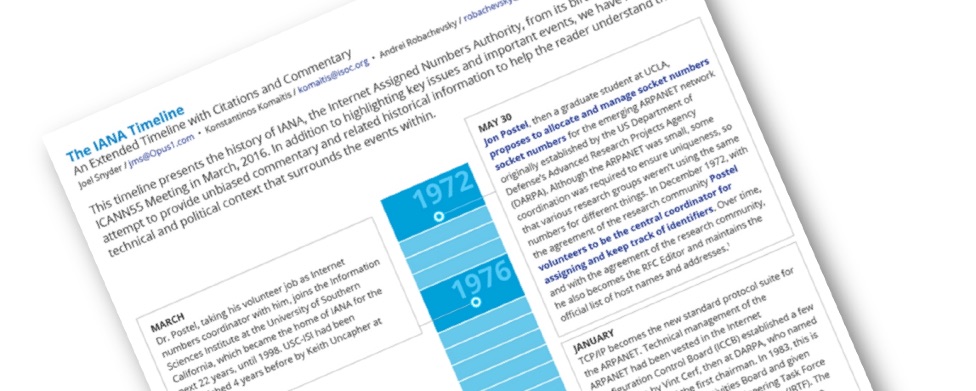While billions use the Internet every day, its inner workings and history are not normally in the public eye. Over the past 30 years, the Internet’s technology, policy, operations, and administration have evolved through both small and large steps. Originally a private research network available to a few, the Internet has become a self-governing and self-managing entity that provides invaluable content and services in every corner of the globe.
The history of IANA, the Internet Assigned Numbers Authority, is tightly tied to the history of the Internet. As a key manager of the naming and addressing used on the Internet, IANA’s role has been quiet, but crucial. Changes in the oversight of the IANA functions mirror the changes in governance, management, and globalization of the entire Internet.
In 2016 and in response to a US government invitation, the Internet community proposed changes to the management, accountability, and structure of IANA to better fit the needs of this tremendously important global network. Currently, the US Government is in the process of evaluating and approving the changes to the final structure of IANA. This history of IANA is offered to the Internet community to help put the proposed changes into context and offer an unbiased account of IANA’s evolution.
– by Joel Snyder, Konstantinos Komaitis and Andrei Robachevsky
Olaf Kolkman:
The history of the IANA demonstrates that a relatively boring function evolved as the key-resource for global interoperability of the Internet. That evolution demonstrates the power of voluntary bottom-up, collaborative decision making that turned a network of networks into a Global Internet.
Scott Bradner:
In March 2014 the U.S. government announced that it might be willing to relinquish control over what had been an obscure Internet coordination function. Since then the Internet Assigned Numbers Authority (the once obscure Internet coordination function) has taken on a persona far greater than it actually warrants. In presenting the history of the IANA and a clear description of its actual role in the Internet, the Internet Society is making it more likely that the discussion of the U.S. government’s current and future roles in managing the Internet will be based on facts rather than speculation symbolism.
Sally Wentworth:
To see what impact the IANA transition will have on the future of the Internet, we have only to look back to see how far we have come. Hard work, a strong commitment to the outcome, and the maturity of the Internet community made this transition a reality.
Izumi Okutani:
History is not just the records of the past but serves as valuable information to understand the present and to shape the future. Before this document, there had not been a compilation of the history of IANA to this level. The document would serve the Internet Community as well as anyone who has an interest in this subject, in better understanding the role and the environment surrounding the IANA functions.
Karl Auerbach:
IANA has been, and will remain, important to the success of the Internet. However, various actors looking more towards their own self-interest than towards the technical stability of the Internet, have used IANA as a football. This football game continues today and will continue in the future. Our best means of assuring that IANA acts for the benefit of the public is to understand how IANA came about, how it evolved, and the job that it is to do and the job that it does.
John Klensin:
A successful Internet of the future requires minimum centralization, both technically and in policy. The same principle was key to its development and spread. IANA must operate in a highly distributed environment, and understanding the history of IANA can help guide us to appropriate future structures.
Dave Piscitello:
All histories are important. The IANA history is particularly important because it captures one of several, related activities that were necessary to transform the Internet from a research and academic network, to ad hoc collections of interconnected IP networks, and finally to a global, arguably critical communications infrastructure that has consistently exhibited near-zero-error performance.
John Levine:
Few online users know about IANA, the bookkeeper of the Internet. Without the records that IANA keeps, your computer couldn’t tell e-mail from the web, networks in New York from networks in New Zealand, and dot com from dot cm. (That’s Cameroon, if you were wondering.) This history traces IANA’s surprising history from a few files kept by a graduate student to a complex organization overseen by many stakeholders.

